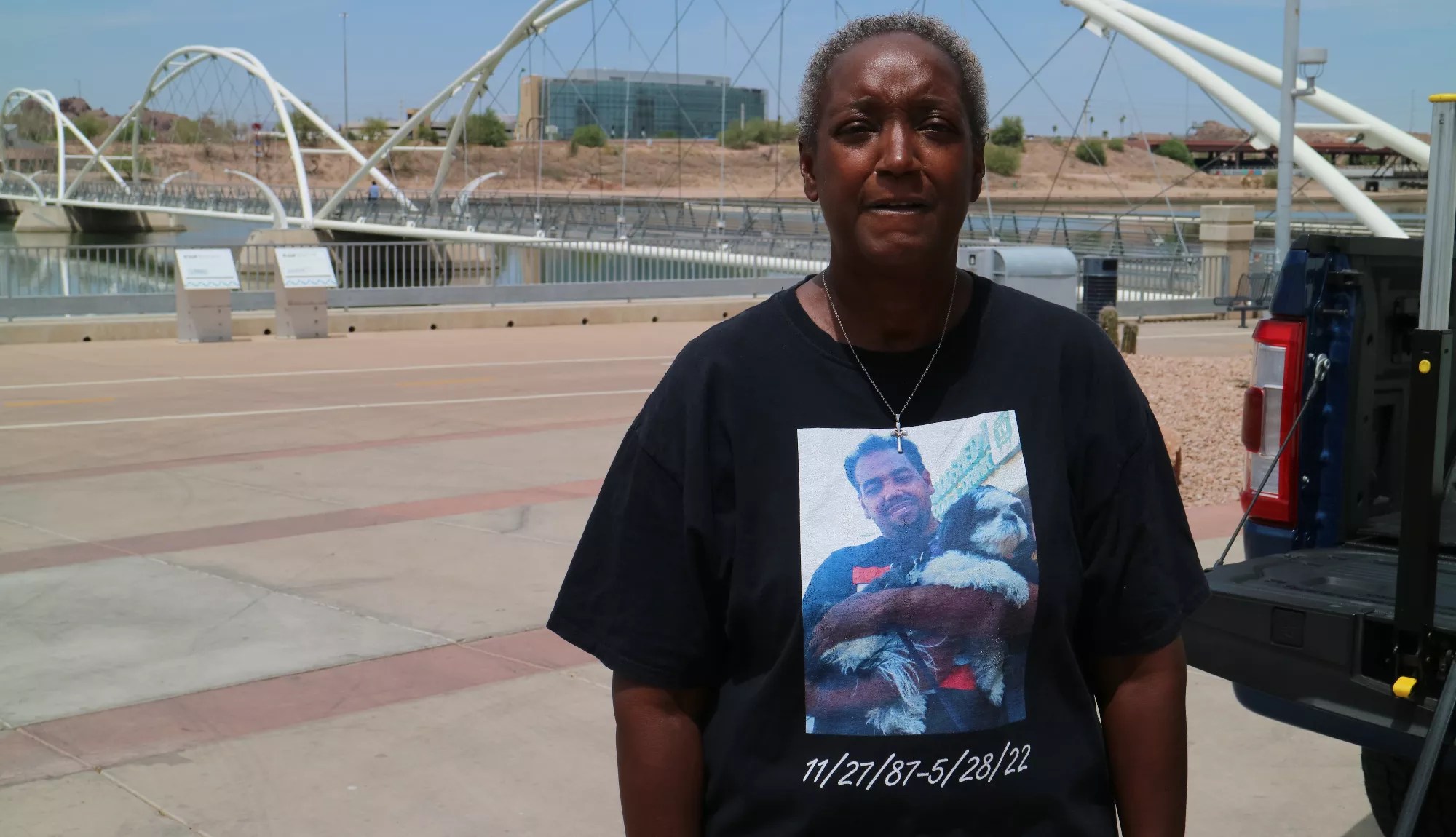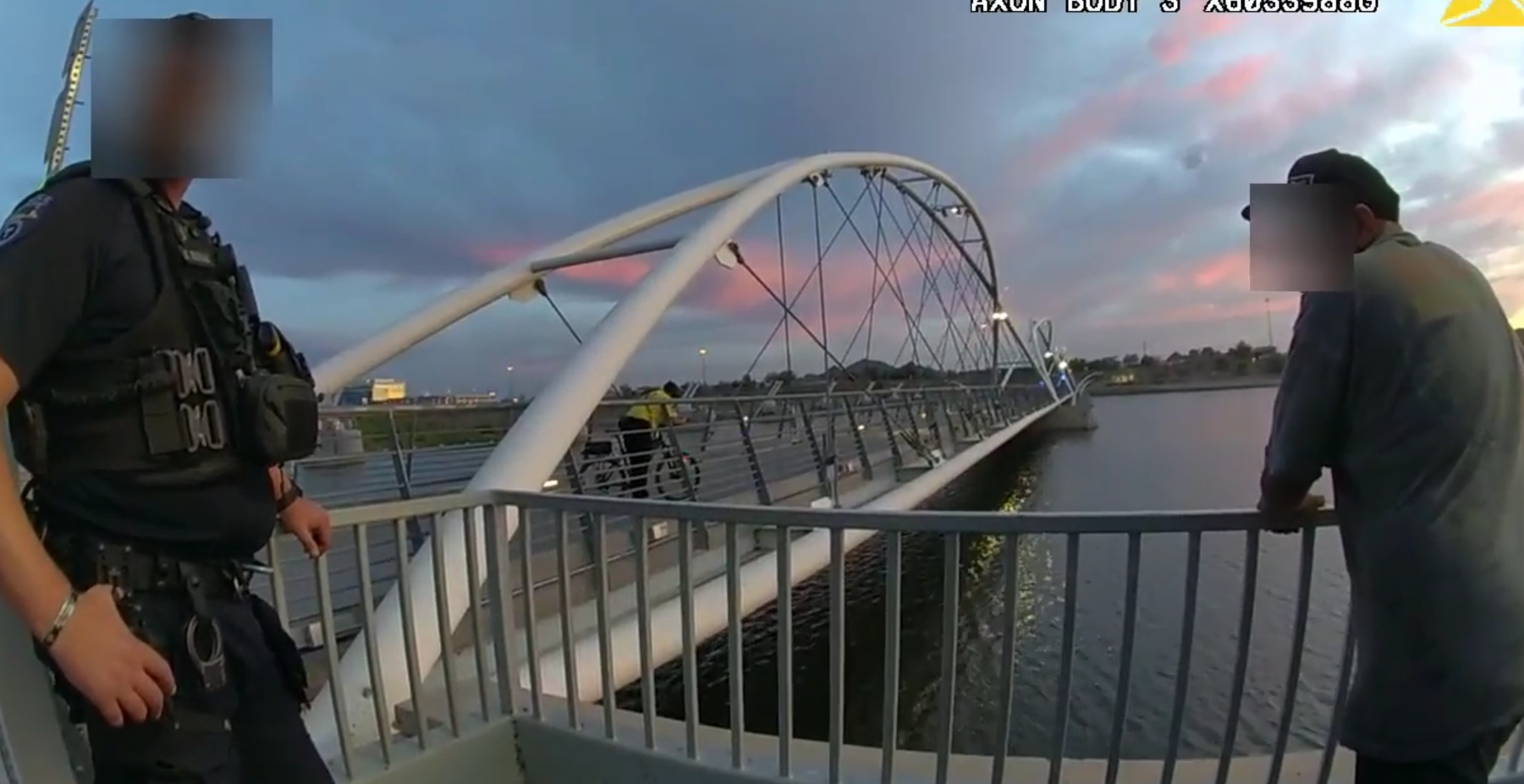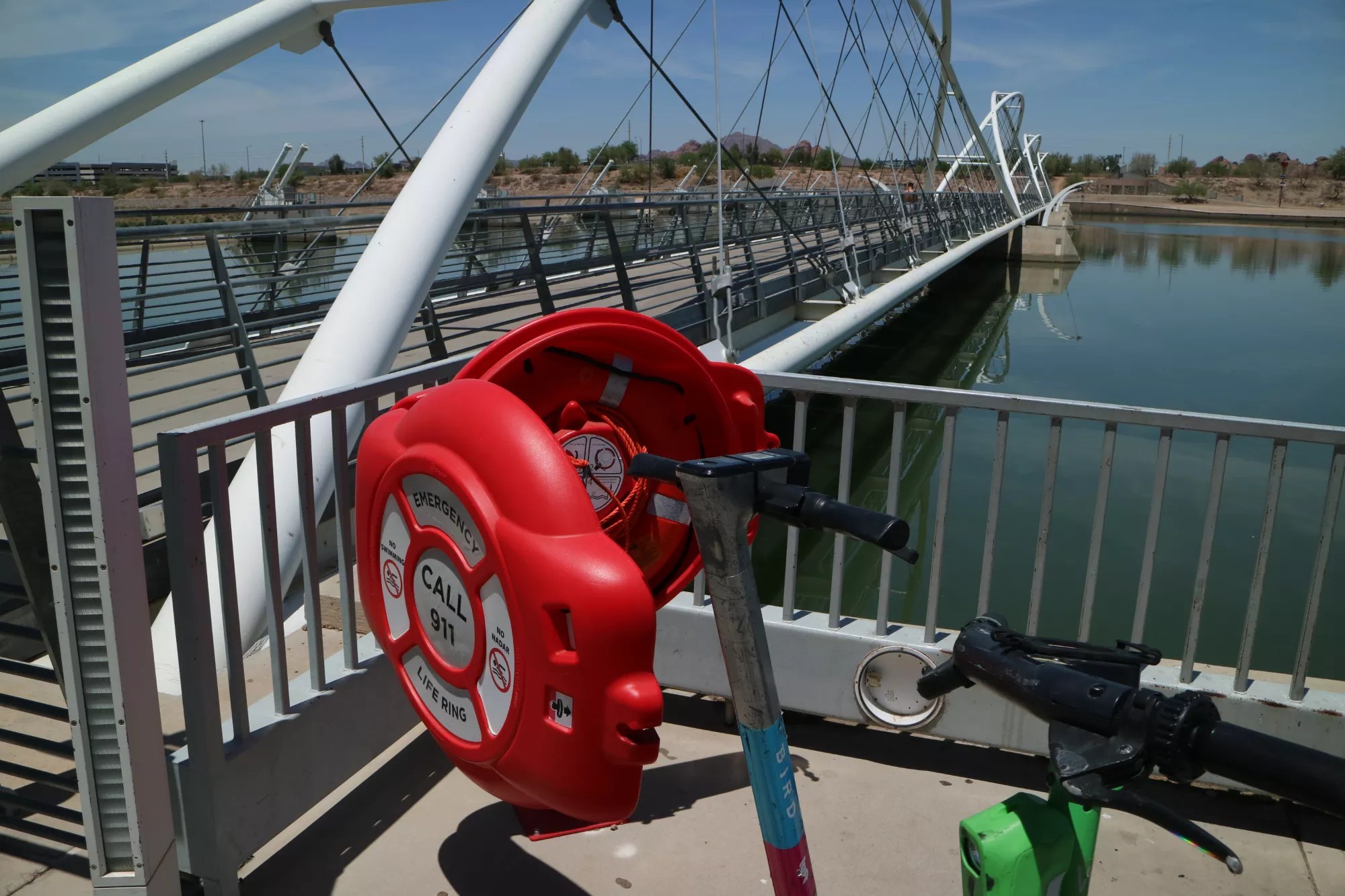
TJ L’Heureux

Audio By Carbonatix
On Wednesday, dozens of people gathered near Tempe Town Lake to mark a somber anniversary.
Three years earlier, 34-year-old unhoused Tempe resident Sean Bickings drowned in the lake. Two Tempe police officers stood by and watched, unwilling to go into the water and unequipped with the proper tools or training to intervene. Bickings’ death made national headlines.
The scandal forced Tempe to make some safety changes, including the installation of flotation rings around the lake. But at a Wednesday memorial for Bickings, his friends and family – including his mother, Turee Toro – criticized Tempe officials for not making more changes to improve safety at the lake. Others have drowned in the lake since Bickings’ death.
“Three years after Sean Bickings’ tragic death, the City of Tempe and the Tempe police still have not added enough safety precautions to Tempe Town Lake,” said Benjamin Taylor, a lawyer who is representing Toro in a wrongful death lawsuit against the city, in a statement to New Times. “Other people have fallen in the lake and drowned since Sean Bickings’ death. We need to see more improvements to minimize the incidents at the lake.”
In a statement, Tempe spokesperson Kris Baxter-Ging said the city “sympathizes with those who mourn the loss of Sean Bickings” and that it has added “improved water safety measures and new procedures.” Those include the dozens of flotation rings and having park rangers patrol the lake.
But many people at the Wednesday gathering doubted the efficacy of those measures, particularly the flotation rings.
“There’s not enough, for one thing,” Toro said. “They’re too far apart and if anybody pulls one out, it doesn’t notify the fire department or the police department at all. To me, they’re just like…a decoration.”
In 2023, Toro filed a wrongful death and negligence lawsuit against Tempe, seeking $3 million for emotional damages. That lawsuit is ongoing, and a Maricopa County Superior Court judge rejected a city motion to dismiss it last year. The Tempe City Council discussed the lawsuit with counsel in an executive session on May 20, and Baxter-Ging declined to comment on the lawsuit.

Bodycam footage shows the moments in which Sean Bickings spoke with officers at the edge of Tempe Town Lake.
City of Tempe
The drowning
Memorial attendees described Bickings as generous and caring, someone who was concerned for the unhoused long before he joined their ranks. He and Toro moved to the Valley from Utah when he was young, and seeing unhoused people was a novel experience for him. On trips to McDonald’s, he’d want to help.
“He’d say, ‘Mom, what about that guy right there?'” Toro said. “So I’d say, ‘What do you wanna do? Do you wanna get something for yourself or for somebody else?’ And that’s what he would choose – somebody else.”
For more than a decade leading up to his death, Bickings lived on the streets. Tempe resident Kush Patel, who got to know Bickings when Patel was a student at Arizona State University, said Bickings would “give you the shirt off his back. And I’ve seen him do it.” Ben Jeffrey, a formerly unhoused military veteran who has since become one of the Valley’s foremost advocates for the homeless, said Bickings was important to many people.
“We all consider him like a best friend,” Jeffrey said. “That’s the thing, all of us – not just like one or two people – but everybody.”
Two days before Bickings drowned, he and other unhoused people met with Tempe officials, including Mayor Corey Woods, about a plan to let unhoused people quash their misdemeanor warrants if they are willing to receive social service assistance.
Forty-eight hours later, an outstanding warrant was the reason Bickings went into the water. Bickings and his partner, Susan Smith, were confronted by police about a domestic violence allegation. Both denied that any violence had taken place and said that they were just arguing. Police decided to check to see if there were outstanding warrants for Bickings, who hopped the fence and sat for a few minutes before jumping into the lake at 5:12 a.m.
“I believe he was terrified of the police department,” Toro said.
According to Toro’s lawsuit, Tempe police officer Jeffrey Gebbie told Bickings to swim to a pylon. When Bickings said he couldn’t, Gebbie responded by saying, “OK. I’m not jumping in after you.”
Bickings began yelling for help and said that he couldn’t touch his feet to the bottom. When it became clear that the police would not save him, he called out for Smith. She tried to jump in to save him, but Officer Kelly Bennett restrained her and Gebbie handcuffed her.
At 5:16 a.m., four minutes after he entered the lake, Bickings went under the water. Police did not recover his body until nearly six hours later.
According to the lawsuit, the police report noted that Tempe has a police boat, but that it requires two people to operate. For that reason, it took some time for it to arrive, by which point Bickings had drowned. At 5:41 a.m., the police report noted that the boat’s operators were not able to get around a barrier in the water.
Tempe enlisted the Scottsdale Police Department to review the incident. The administrative review found that officers acted correctly and should not have entered the lake to save Bickings.

A flotation ring at Tempe Town Lake.
TJ L’Heureux
Demanding more
Donavan Lewis befriended Bickings while both were unhoused on the streets of Tempe, though Lewis has since found housing and helps those who lack it. Bickings’ death and the circumstances that led to it still wound him.
“The whole situation could have been avoided, in my eyes, if the police officer would have actually done something instead of turning around and saying, ‘I’m not jumping in to save you,'” Lewis said. “That hurt me. Seriously. You’re supposed to be serving and protecting. Why not serve him?”
Toro’s lawsuit notes that just 11 days before Bickings’ death, Tempe police officers helped rescue a dog from the Tempe canal. “Those Officers were willing to confront that risk for a dog on May 17, 2022,” the suit reads, “but, on May 28, 2022, the involved Defendant Tempe Police Officers did not even walk to the bank of the Tempe Town Lake while a human being drowned to death in front of them.”
In addition to stronger safety measures, Toro would like to see Tempe make more efforts to help the homeless, including by addressing the warrant issue Bickings had confronted. She said city officials were ultimately unwilling to work with unhoused people to let them meet where they were comfortable to resolve warrants.
“At that time, it became apparent that nothing was going to be done,” Toro said Wednesday. “I was given false promises to appease me and that is the reason I am here today.”
Baxter-Ging said the city has had open hours at Tempe Municipal Court for warrant resolution and that it participates in the Maricopa County Regional Homeless Court. It’s unclear if those efforts began before or after Bickings’ death – Baxter-Ging did not respond to a question seeking clarification.
Still, Toro noted that she and others recommended meeting with unhoused people where they felt comfortable: at shelters that provide food and have come to be trusted by an unhoused community that is deeply skeptical of law enforcement and city officials.
“I would like to ask the city of Tempe to ask themselves: What if you or a family member were in the situation some of the homeless communities are in today?” Toro said. “Would you not do everything you could to make sure they had what they needed, or at least the best you could?”